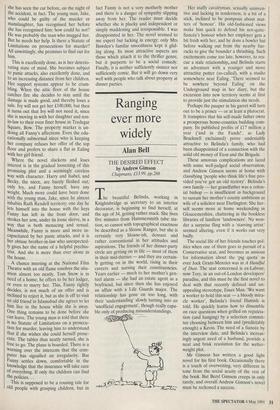Ranging ever more widely
Alan Bell
THE DESIRED EFFECT by Andrew Gimson Chapmans, £13.99, pp.288 The beautiful Belinda, working in Knightsbridge as secretary to an interior decorator, is beginning to find herself, at the age of 34, getting rather stuck. She lives five minutes from Hammersmith tube sta- tion, so cannot with topographical exactness be described as a Sloane Ranger, but she is certainly very Sloane-ish, demure and rather conventional in her attitudes and aspirations. The friends of her dinner-party circle are getting on in life — most of them in their mid-thirties — and they are certain- ly getting on in the world, rising in their careers and nursing their constituencies. Years earlier — much to her mother's gen- teel alarm — she had an estate agent as a boyfriend, but since then she has enjoyed an affair with a Life Guards major. The relationship has gone on too long, with their 'understanding' slowly turning into an 'unofficial engagement', though really capa- ble only of producing misunderstandings.
Her stuffy cavalryman, sexually uninven- tive and lacking in tenderness, is a bit of a stick, inclined to be pompous about mat- ters of 'honour'. His old-fashioned views make him quick to defend his not-quite- fiancée's honour when her employer gets a bit fresh with her, and he dons a bowler hat before walking out from the nearby bar- racks to give the bounder a thrashing. Such excitements come too late, however, to res- cue a stale relationship, and Belinda starts an adventure with a younger and more attractive potter (so-called), with a studio somewhere near Ealing. 'There seemed to be nowhere beyond Ealing' on the Underground map in her diary, but the excursion into new territory seems at first to provide just the stimulation she needs.
Perhaps the pauper in his garret will turn out to be a prince — or at least a plutocrat. It transpires that his self-made father owns a prosperous home-counties building com- pany. Its published profits of 17 million a year ('and in the Funds!', as Lady Bracknell exclaimed) prove undeniably attractive to Belinda's family, who had been disappointed of a connection with the solid old money of Eton and the Brigade.
These amorous complications are laced with some well-judged social observation, and Andrew Gimson seems at home with classifying 'people who think life's fine pro- vided you've got an old rectory'. Belinda's own family — her grandfather was a colon- ial bishop — is insufficient in background to sustain her mother's county ambitions as wife of a solicitor near Darlington. She her- self seems more at home weekending in Gloucestershire, chattering in the bookless libraries of landless 'landowners'. No won- der a surprise fling with a 'starving artist' seemed alluring, even if it works out very badly.
The social life of her friends touches pol- itics when one of them goes in pursuit of a Conservative seat, and becomes as anxious for information about the 'pig quota' as ever Jock Grant-Menzies was in A Handful of Dust. The seat concerned is ex-Labour, now Tory, in an out-of-London developers' paradise, and this must be the first novel to deal with that recently defined and un- appealing stereotype, Essex Man. 'We want a worker to hold this seat — a bloody mira- cle worker', Belinda's friend Hamish is told. He quickly learns how to dissemble on race questions when grilled on repatria- tion (and hanging) by a selection commit- tee choosing between him and (predictably enough) a Kevin. The need of a fiancée by the interview date, and Belinda's increas- ingly urgent need of a husband, provide a neat and brisk resolution for the welter- weight plot.
Mr Gimson has written a good light novel for his first book. Occasionally there is a touch of overwriting, very different in tone from the social acuity of the rest of the book. But Beryl Gimson creeps in only rarely, and overall Andrew Gimson's novel must be reckoned a success.


















































 Previous page
Previous page